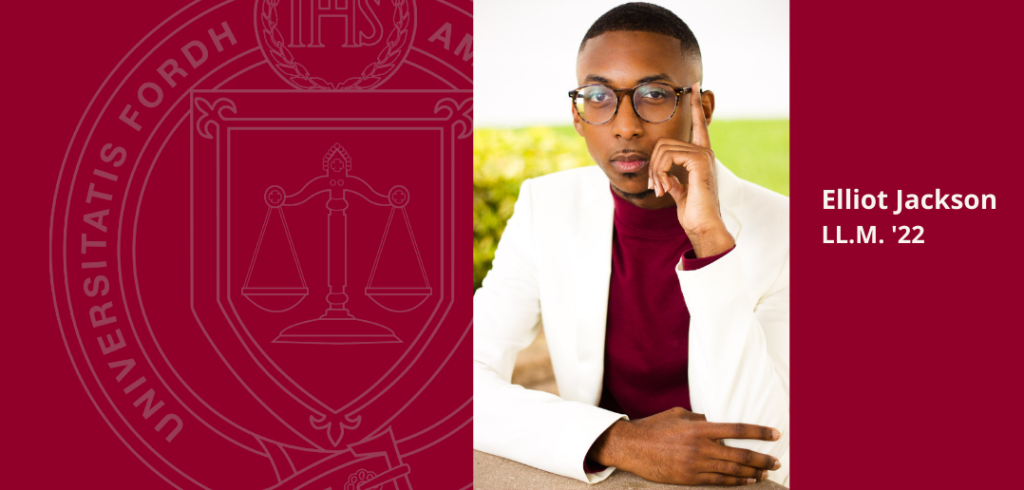Elliot Jackson LL.M. ’22 first became interested in fashion law during his first summer of law school in 2018. While waiting in line to go inside a Las Vegas nightclub with a group of friends, Jackson was turned away because of the shoes he was wearing. He was told that the Nike Air Jordans he had paired with his formal jacket and shirt were not permitted in the nightclub.
“That kind of piqued my interest and prompted my research on the intersection of fashion and social justice,” says Jackson. “It’s not just, ‘oh, you’re wearing basketball shoes or you’re wearing athletic clothing. It wasn’t broad,” he continued. “This was a specific item—Jordans.”
After doing some research, Jackson found that there was at least one bar, restaurant, or nightclub in each state that had racially-biased dress code restrictions. He uses the term “velvet rope racism” to describe the experience of fashion-based discrimination that occurs in places of public accommodations, but specifically nightlife settings. His research interest in the topic led him to Fordham Law where he is now an LL.M. student in the Fashion Law program.
Originally from Charlotte, North Carolina, Jackson completed an undergraduate degree in forensic biology at Fayetteville State University (“I had the crazy idea that I’d be a doctor,” he says) but soon realized that law was likely a better fit and enrolled in the J.D. program at Florida A&M University. During his time there, Jackson wrote a note, as a part of his membership on the Florida A & M University Law Review, about his experience with fashion-based discrimination at the Las Vegas nightclub. That note then became the basis for a paper, which will soon be published in the Southern Journal of Policy and Justice.
In his paper, Jackson traces the history of fashion discrimination back centuries to sumptuary laws and fashion-based class distinctions that existed all over the world. In the United States, laws like these are enmeshed in the country’s long history of slavery.
Jackson notes the example of restaurants that refer to themselves as “white tablecloth” establishments, invoking (intentionally or not) the history of fine white linens being reserved for white slave owners while coarse, rough textiles—also known as “slave cloth”—were reserved for enslaved people.
“These are the subtle undertones that are present when it comes to fashion intersecting with just everyday living,” says Jackson. “My research goes into all of that.”
Other issues Jackson has examined include policies against “sagging pants” that are meant to target people of color, as well as “brown liquor bias,” wherein restaurants won’t serve cognac or other liquors they associate with Black patrons in order to discourage them from visiting certain bars and restaurants.
“I argue that racism is not completely overt anymore because it’s no longer allowed,” Jackson explains. “So it’s covert in the sense that businesses use dress codes, among other things, to target certain groups of people.”
Jackson is currently enrolled in Professor Kenya Wiley’s Fashion Law and Social Justice course, which he says has opened his eyes to more ways that fashion intersects with legal issues.
“I never would have thought that fashion had legislative, regulatory, and policy implications before taking this course,” he says. “I’ve since gained an appreciation for that.”
This was exactly the type of research the course was designed to explore, according to Professor Wiley. “I created the Fashion Law and Social Justice course for students to analyze legal and policy developments impacting the fashion industry, and to better understand the steps in building an effective social justice framework,” she says. “Students are encouraged to identify current gaps in fashion law and develop legislative and regulatory solutions that address the industry’s most significant challenges.“
The solution for the fashion-based problems he’s researched, according to Jackson, lie in permitting disparate impact claims through Title II of the Civil Rights Act, which states that “all persons shall be entitled to the full and equal enjoyment of…goods, services, facilities, and privileges…without discrimination or segregation on the ground of race, color, religion, or national origin.”
Jackson says he hopes to pursue a career that helps push forward some of these issues in the fashion industry, whether through litigation or other legal means.
“The little things, like getting dressed every day, have an impact” says Jackson, explaining that fashion is an industry valued at more than $3 trillion. “With that in mind, I just wish people were more cognizant of their own biases.”

